An American Love Story
The hit show 90 Day Fiancé shines an unsparing light on America’s fascination with marriage and anxiety about immigration.


The loft apartment is mostly bare. The new tenant, Rebecca Parrott, sleeps on a mattress on the polished concrete floor in the bedroom where her daughter Tiffany’s partner, Micah Smith, is setting up a TV. Parrott has no couch, no bed frame, no TV stand. One thing she does have: photos of her fiancé, Zied Hakimi. In fact, Hakimi is everywhere: On the kitchen countertop sits a photo of the attractive couple in a frame with sand from the Sahara desert, the site of Hakimi’s proposal. Photos of him are also in Parrott’s car and bathroom and on her debit card. At night, she cuddles a teddy bear doused in Hakimi’s Lacoste cologne. To some, it may seem excessive, but to Parrott, it is a way to stay connected to a man who lives halfway across the world.
Today, March 8, the man she’s been talking to “all day long, every single day, for two years” is finally coming to live with her in Canton, Georgia, about 40 miles north of Atlanta. “It really doesn’t feel real,” she says.
Millions of people are invested in the unlikely, rocky long-distance romance between Parrott, 49, a white restaurant manager from the American Southeast, and 27-year-old Hakimi, an Arabic-speaking Muslim man who recently graduated from HVAC school (technical training for heating, ventilation, and air conditioning) in Tunis, Tunisia. The couple’s love story is among dozens chronicled on TLC’s hit franchise 90 Day Fiancé.
The two began talking after Hakimi appeared in Parrott’s “People You May Know” suggestions on Facebook in April 2018. She was separated from her third (now ex) husband. She sent a friend request to Hakimi, whose profile said he lived in Lafayette, Louisiana. The exchanges were easy and flirtatious. By the time she discovered the truth—that Hakimi was actually from Tunisia’s Lafayette province—she was already in love. (Hakimi’s location error on Facebook, Parrott says, was unintentional.) For two years, they’ve maintained a relationship primarily online, with Parrott spending thousands of dollars on plane tickets and the visa process. They have spent only three weeks physically together: in late 2018, when Parrott visited Hakimi in Tunisia.
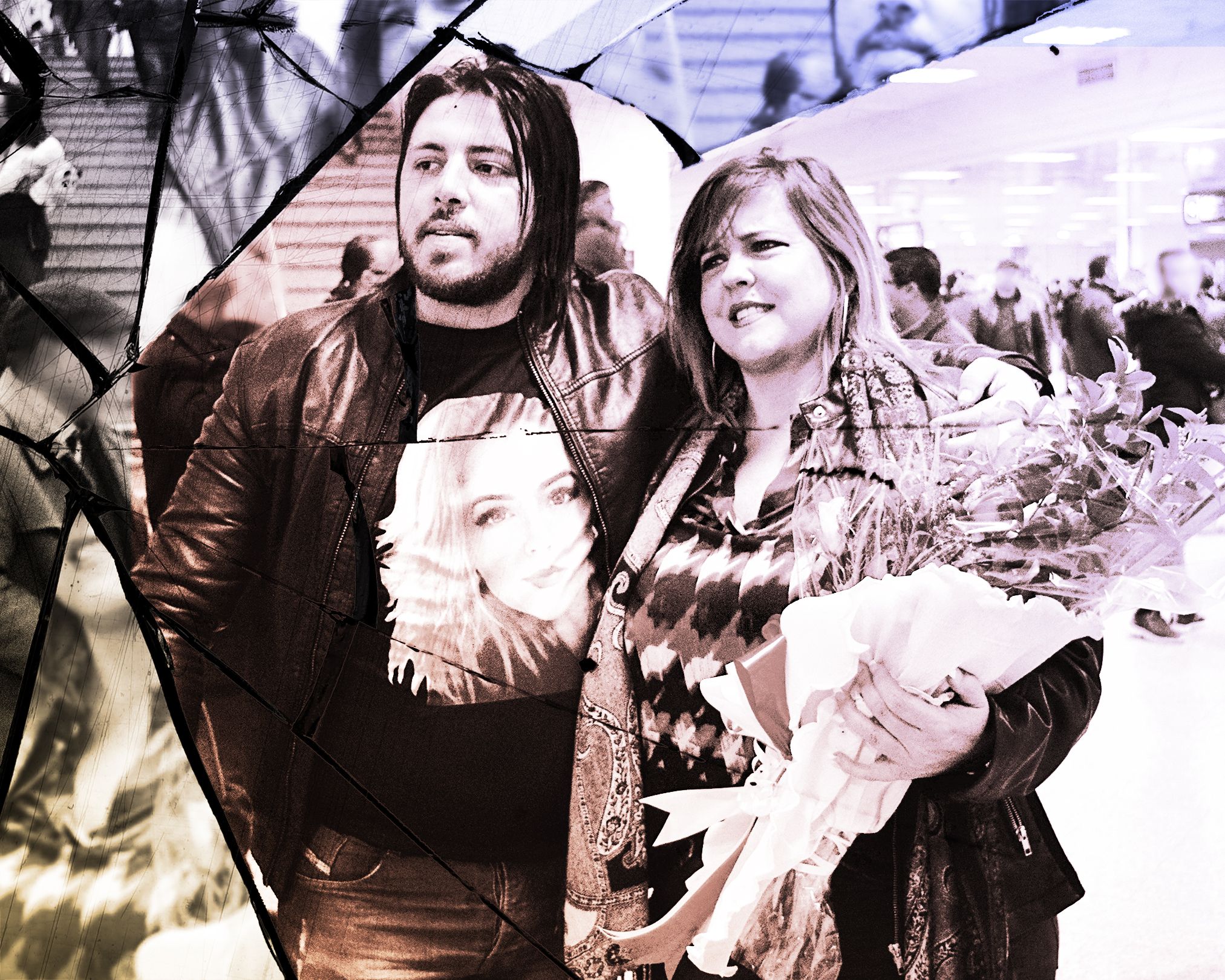
Zied Hakimi greeted Rebecca Parrott at the airport in Tunisia wearing a shirt emblazoned with her photo on Before the 90 Days.
Soon, they’ll graduate from the franchise’s Before the 90 Days series (which features Americans traveling overseas to visit their partners, in what is often their first in-person meeting) and make their debut on the original 90 Day Fiancé show, now entering its eighth season. The franchise is a ratings juggernaut, with 10-plus spin-offs; according to TLC’s parent company, Discovery Inc., it “is one of the top performers,” making the network “the #1 most-watched in the U.S. among women aged 25 to 54.”
The show has spawned active Reddit communities with tens of thousands of followers and multiple recap podcasts, including 90 Day Fiancé Cray Cray, which has nearly 500,000 listeners per month. Famous fans include model/entrepreneur/author Chrissy Teigen and her musician husband, John Legend, who parodied an infamous fight between Before the 90 Days couple Darcey Silva and Jesse Meester to promote Teigen’s kitchenware and tabletop line on Twitter. Writer/actress/producer Mindy Kaling tweeted that the blunt and hot-tempered cast member Anfisa Nava of Russia—who, in addition to saying she deserves a wedding dress costing tens of thousands of dollars, also inexplicably keyed Idiot on her then-fiancé Jorge Nava’s car—“is my favorite character on any show, any time, in TV history.” In a 2018 interview, Ellen DeGeneres asked Lady Gaga, “If you could only watch one reality TV show for the rest of your life, what would it be?” Gaga replied: “90 Day Fiancé.”
The chaotic premise, coupled with the personality types that choose to thrust themselves into it, makes for addictive television. Unlike what you see on most reality dating shows, 90 Day Fiancé’s high stakes aren’t manufactured by producers. Instead, they are imposed by the federal government. The various permutations of the series chronicle the journeys of U.S. citizens who sponsor a foreigner under the K-1 nonimmigrant visa, also known as the “fiancé visa,” which requires couples to marry within 90 days of the foreigner touching U.S. soil. (If couples fail to marry, the foreigner must leave America or risk deportation.) “The original concept was following Americans abroad; they’ve met [someone] online,” says Matt Sharp, CEO and founder of Sharp Entertainment, an Industrial Media company, which produces the 90 Day franchise. Networks rejected that pitch. Then his team encountered the K-1 visa. “We thought this was a really fascinating world where Americans were kind of risking it all for love,” Sharp says.
Get exclusive access to fashion and beauty trends, hot-off-the-press celebrity news, and more.
While the show has been on the air since 2014, its recent explosion in popularity has coincided with America’s heightened anxiety over immigration and xenophobia. “Because immigration is definitely in the conversation now, that could have an impact on why so many people are interested in the show,” says Shaun Robinson, host of the 90 Day Fiancé franchise’s talk-show-format “Tell All” finales. The Trump administration’s travel ban on refugees and immigrants from certain Muslim–majority countries has added extra stress and uncertainty for some of the couples, including Parrott and Hakimi. “I don’t want to say anything negative about Trump because the government gave us the visas, so I’m trying to be as nice as I can—but, with Trump being in office,” she says, “we were very concerned.” Parrott worries about how her fellow Georgians may react when they learn that pale-skinned, green-eyed Hakimi is Arab. Micah, Tiffany’s partner, is wary of Hakimi and expresses some of the stereotypical views Hakimi may encounter as a Muslim Arab man in the South: “America has a culture,” he says, adding that if Hakimi is yelling on the phone in Arabic—whether he’s saying “Allahu Akbar” or even just talking to his parents—“people might look at him weird.”
The show’s tension is driven by one point: Are they really in love, or do they have ulterior motives? “One of the number-one questions I get is, ‘Is it real?’ ” says Robinson. Cast member David Toborowsky, 52, doesn’t fault viewers for questioning the intentions of couples on the show, including his own and those of his wife, Annie Suwan. Toborowsky met Suwan, 24 years his junior, in Thailand while getting over a divorce, and the pair fell in love. “Of course you’re going to be skeptical when you see a hot-looking person with somebody who is not so hot and you have age differences,” he says. “It’s very hard, because when you fall in love, you get married, you worry about what your family thinks. In this case, you have to worry about what an immigration officer thinks.”
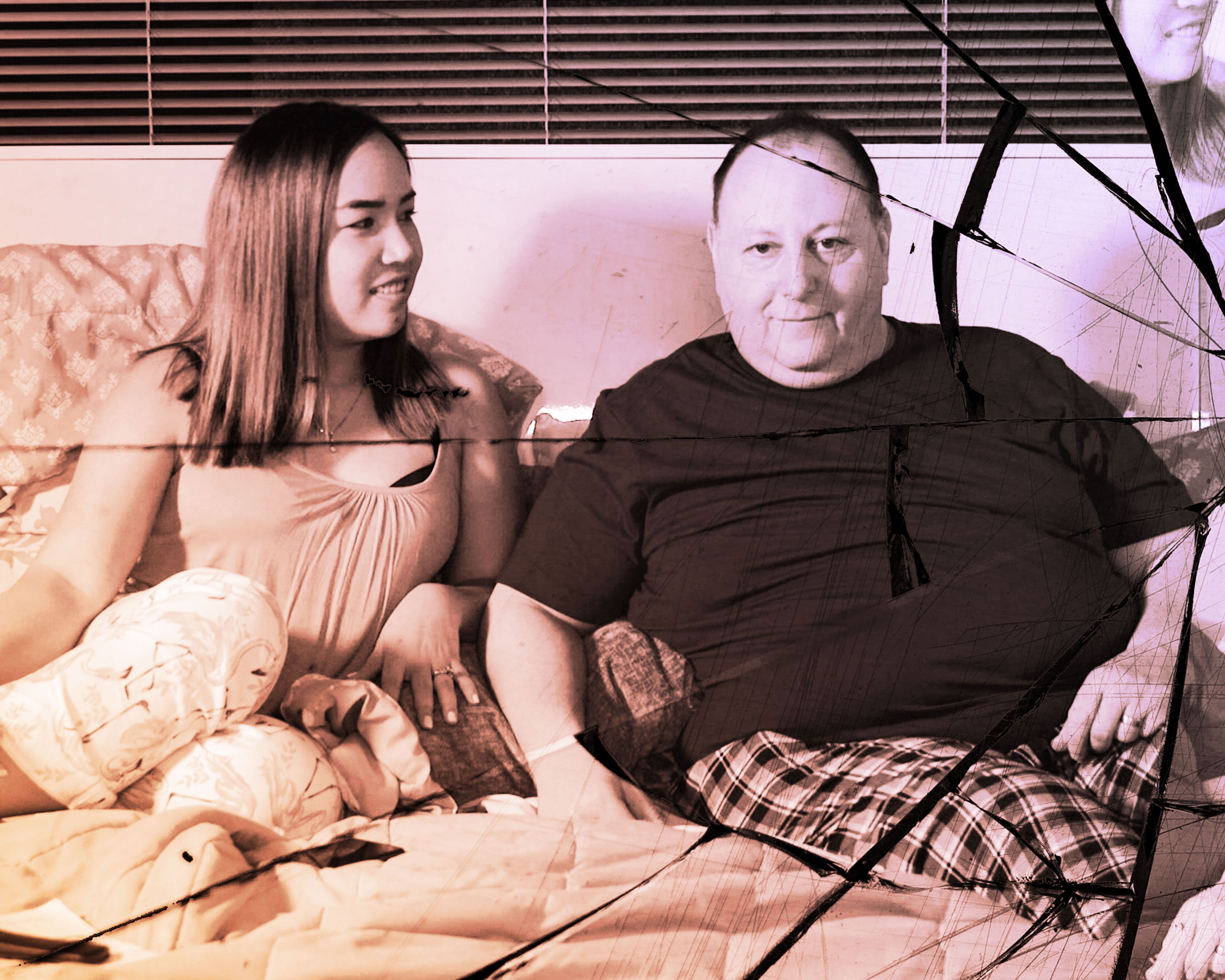
Annie Suwan and her husband David Toborowsky during Pillow Talk following season four of 90 Day Fiancé: Happily Ever After?
Whether the show’s love is authentic is a loaded question that plays into the imagined pervasiveness of so-called green-card marriages—fraudulent marriages designed to evade immigration laws. Perhaps no pair better demonstrates these tensions than Danielle Jbali (formerly Mullins), 47, a white mother of four from Ohio, and 32-year-old Tunisian Mohamed Jbali, who plowed forward with a seemingly passionless marriage 16 months after meeting in an online chatroom. Their relationship has been remarkably tumultuous: Mohamed has said “she lied to me about everything” after Danielle repeatedly misrepresented her precarious financial situation. Danielle claimed Mohamed must be cheating because of his refusal to have sex with her. After receiving his green card, Mohamed, who had already left Danielle, moved to Miami. “I felt used,” Danielle said on the show. “So I filed for an annulment. That was my best chance to get him deported.” (She later agreed to a divorce, enabling Mohamed to stay in America.) In a particularly heated exchange during the second season’s “Tell All” episode, “90 Day Fiancé: Happily Ever After?” cast member Loren Brovarnik said to Mohamed, “There’s such a bad stigma about the K-1 process and the green card, and we, unfortunately, are associated with it. …Mohamed, you are a fraud.”
Marriage fraud, defined in the Immigration and Nationality Act, is when an individual “knowingly enters into a marriage for the purpose of evading any provision of the immigration laws.” It’s a federal crime punishable by up to five years in prison and fines up to $250,000. But such marriages are likely uncommon, contrary to what pop culture and politicians would have us believe. Danielle Bennett, a spokesperson for U.S. Immigration and Customs Enforcement (ICE), told Marie Claire that “there is no data specific to marriage fraud” but pointed to a quote from an ICE agent who estimated the rate of marriage fraud for couples using K-1 visas to be between 5 and 15 percent in 2014. In 2009, Janet Napolitano, then the secretary of the Department of Homeland Security, said, “There is a perception that marriage fraud is a rampant problem in the immigration system, but most marriages coming before USCIS are bona fide.” To be clear, the government has not charged any couple from the 90 Day Fiancé show or spin-offs with marriage fraud, and we found no indication of pending investigations.
Though Hakimi’s flight doesn’t arrive at Atlanta’s Hartsfield-Jackson International Airport until late afternoon, the production crew gathers at Parrott’s apartment by noon to get footage of her preparing the home the couple will share. The crew is also there to capture Parrott’s reaction when Tiffany and Micah tell her that, against Parrott’s wishes, they will be driving back from the airport in the same car as the reunited pair. An ensemble of 10—including crew members, producers, a publicist, and me—crams into Parrott’s 1,400-square-foot apartment. At times, we duck into closets or the bedroom so that none of us appear in shots. Field producer Allison Kagan uses an iPad to constantly monitor footage from cameras that stream live from all over the apartment. The approximately 12 hours of footage from the day will be spliced and edited down to about 10 minutes of TV gold.
Producers deny reports that the show is scripted. Alon Orstein, senior vice president of production and development for TLC, says the show’s authenticity is one of its strengths. Other successful shows might be more contrived, with “people being put together; there’s been some sort of matchmaking element,” he says, but “these are people who are finding each other on their own. And we’re finding them and following their journey.” Another producer says that sometimes conversation is guided, or information is strategically withheld until the crew can capture the emotional fallout. When she pulls Parrott aside for a solo interview, Kagan prompts: “[Micah and Tiffany] want to plan the day, and what do you want?”
During the hour-long drive to the airport, the production crew travels in two cars, tailing Parrott, Micah, and Tiffany, and listens to them via a receiver. “I’m so excited,” Kagan exclaims. “I just love love, you know? That’s the theme of the show: the quest for it, the yearning of it, the losing it, the obsession about it.”
This is a sentiment often expressed by producers, publicists, and executives at TLC: 90 Day Fiancé is a show about how far people are willing to go for love. That’s a sophisticated spin on a show podcaster Kim Cray (the pseudonym of the 90 Day Fiancé Cray Cray cohost) describes as a “trash-dumpster fire.” Like much of reality TV, 90 Day makes it easy to gawk at and pass judgment—guilt free—on the bizarre and even toxic things people will tolerate because they’ve invested so much into a relationship. “People watch [reality TV] to escape their own lives,” Parrott says. “And when they see every bit of the hot mess that my life could possibly be, it helps them think, ‘Well, you know what? My life looks really good compared to hers,’ and it gives them an outlet.” Voyeurism plus schadenfreude plus romantic ideals equals hit reality drama.
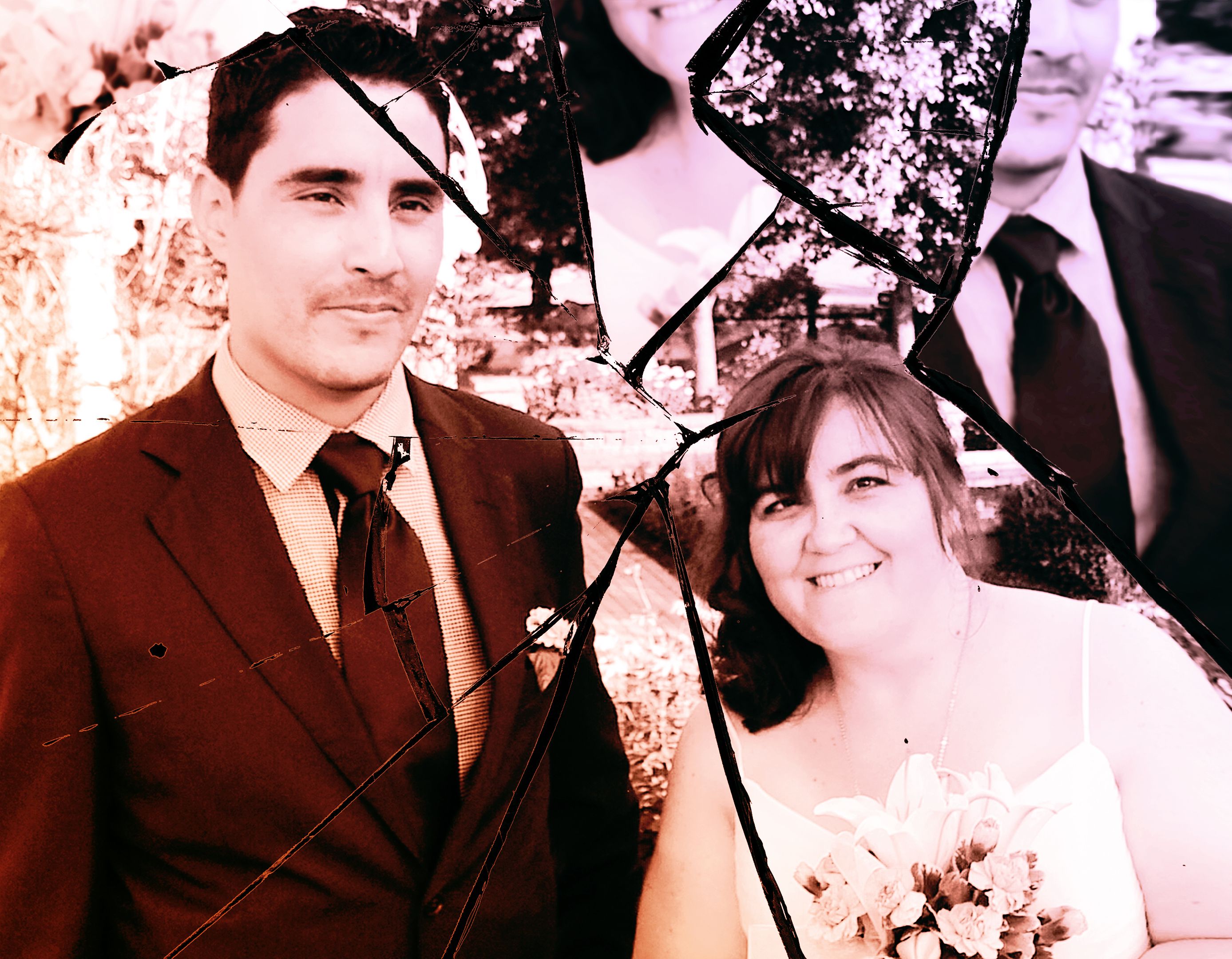
Danielle and Mohamed Jbali on their wedding day in Ohio. Later, she wanted to file for an annulment—and get him deported—but she agreed to a divorce in the end.
Hakimi and Parrott’s romance has had its dramatic moments: Hakimi was angry at seeing a photo of Parrott’s ex on her phone. TLC teased the episode with a clip Parrott calls “misleading” in which Hakimi put his hand consolingly on the back of her neck. Out of context, it looked aggressive, and some fans called Hakimi abusive. Parrott came to his defense in an Instagram post: “Zied has NEVER been abusive. Zied would NEVER be abusive. This is dangerous to make light of and it needs to stop now.” She adds: “In addition, TLC and Sharp Entertainment would not only not have allowed [abuse], but would not have aired it.”
Sharp says that the crew prioritizes the safety of the cast members and would “shut down production” or contact authorities if any violent incident occurred. But the show has aired several troubling moments, including scenes of Anfisa hitting Jorge. In March, fans launched a petition to remove cast member Geoffrey Paschel from the series after he was charged with aggravated kidnapping, domestic assault, interference with an emergency call, and vandalism, which court records show. A TLC source confirmed that the network does “incredibly thorough background checks” on cast members but did not previously know about the charges. According to TLC, the most recent charges occurred after the background check. Once production was made aware, it ceased shooting Paschel, and TLC is “waiting to see how this plays out in the courts.” Still, there are no plans to remove Paschel’s segment from the existing show. “I mean, we’re done with his story anyway,” the source adds.
The show amps up some drama for ratings, but producers are careful to sidestep weightier issues such as current anti-immigrant sentiment and policies. “We never really look at it as an immigration show,” says Orstein. He sees it as “empowering,” a window into “how people from incredibly different walks of life can fall in love and start a life together.”
90 Day may not be an “immigration show,” but it is hard to deny that the show is profiting from the current climate. Kerry Abrams, dean of the Duke University School of Law, who has written extensively on the history of immigration and family law, has said that during previous immigration waves, American courts “used notions of what a ‘real’ marriage looked like in order to make decisions about whether to admit or exclude an immigrant.” How we define marriage remains top of mind today. According to June Deery, author of the book Reality TV and professor and department head of communication and media at Rensselaer Polytechnic Institute, 90 Day exposes the “extent to which relationships anywhere in the world are about trading sex for money—or, less bluntly, love for security.” Determining how much of a relationship is transactional versus how much is love makes for compelling television. Ultimately, 90 Day is a no-holds-barred exploration of the sometimes crass calculations and trade-offs people are willing to make in order to gain security—real or imagined—a question central to all romantic relationships.
By skirting around the controversial issues it raises, the show is at times little more than a fun-house mirror reflecting a warped version of our messy reality back at us, a way to process anxieties about the fraught immigration system without having to think too deeply about them.

Paola and Russ Mayfield, who have been married since appearing on the first season of 90 Day Fiancé, speak onstage at an event for Discovery Inc. in 2018.
It’s also a wild carnival ride with truth-is-stranger-than-fiction twists and turns. There are seemingly one-sided relationships between Americans who fall in love with people they talk to online, in some cases even sending them thousands of dollars. There is a woman who falls in love with a man half her age and moves across the globe, only to discover that he’s already married. The show is the riveting sum total of the crazy, unpredictable moments that result from these cultural misunderstandings and the personalities who persist in these relationships.
At the airport, Parrott and the production crew wait for Hakimi at International Arrivals, holding posters that notify passersby that they may appear on camera. “I’m so excited and nervous and scared,” Parrott says. When one man asks Kagan what they are filming, the producer replies, “A documentary.”
Thirty minutes go by, and Parrott slowly inches forward at the arrival gate until she stands at the line marked No Entry. Then, another 30 minutes pass. Parrott begins to speculate: Did he miss his connecting flight in Germany? Was he wearing his mask? (COVID-19 was just beginning to spread in America.) “Ultimately, we don’t know what [Zied’s] intentions are,” Parrott concedes. “I just know that he’s a good man, and he’s given me no reason to worry. I feel like it’s [worth the] risk at this point.” Then, after another five long minutes, a polished man in a white shirt and gold-rimmed glasses walks through the door. Parrott lunges toward him for a kiss. “Nothing now make me nervous,” Hakimi says in broken English. With an arm around Parrott, he smiles and says, “I am here with my wife.” The next three months will determine the truth of that statement. For now, the clock has started its furious ticking, and the couple (and producers) have only so much time to see if they can make it in America.
This story appears in the Fall 2020 issue of Marie Claire.
RELATED STORIES
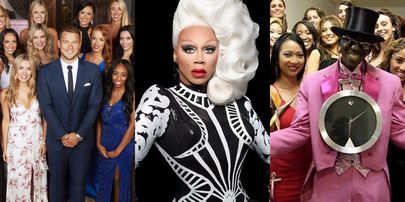
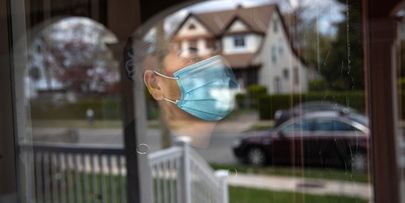
Prachi Gupta is an award-winning journalist based in New York. Her first book, about Rep. Alexandria Ocasio-Cortez, is available via Workman Publishing.
